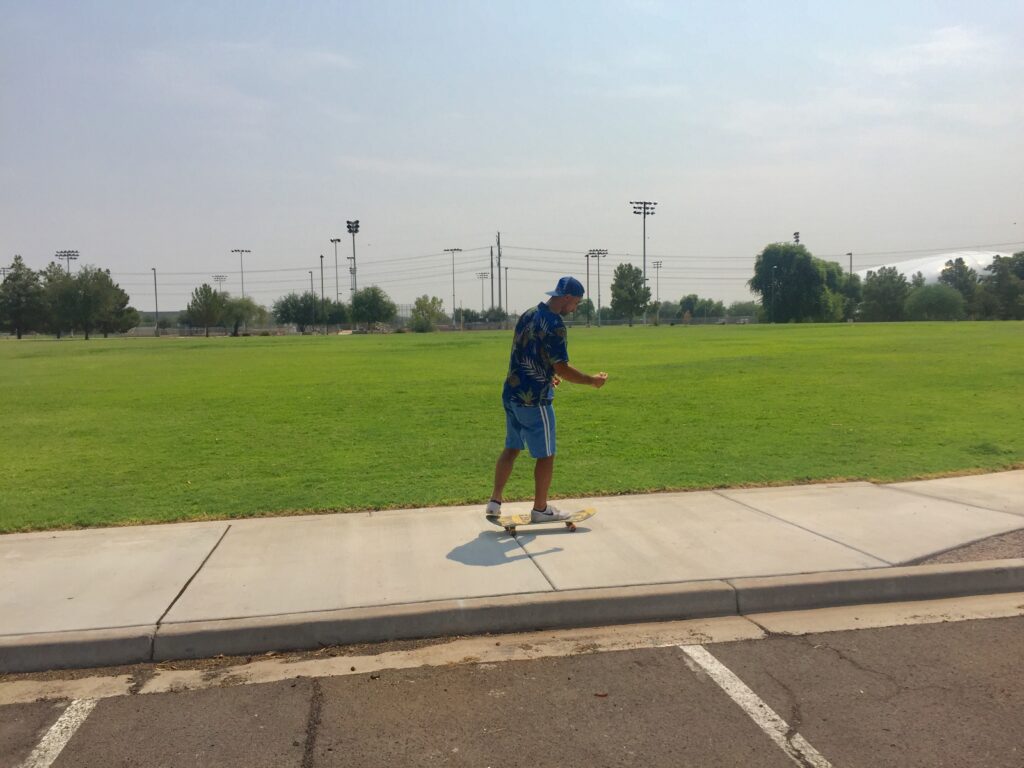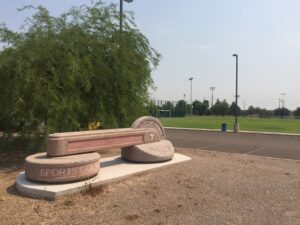
Have you ever taken a child or a pet to a city park to frolic and enjoy the outdoors, wondering what you might be exposing them to as they play on the grass?
Pesticides? Harmful chemicals from fertilizers and other maintenance products?
The folks at Tempe City Hall wondered the same thing, so they entered into a partnership to convert select city parks to a “green” maintenance pilot program, a nonchemical approach to turf and landscape management, with an eye toward converting all city parks.
Tempe Sports Complex and Dwight Park will be among the early adopters. Tempe is teaming with Stonyfield Organic, Beyond Pesticides and Osborne Organics in the #PlayFree initiative, which aims to convert public parks and playing fields across the country to organic grounds management.

“We found that over 26 million kids play on parks and fields and that 65 percent of those fields are managed with a chemical cocktail of harmful pesticides,” said Britt Lundgren, Director of Organic and Sustainable Agriculture at Stonyfield Organic. “To help make all parks and fields organic and free from harmful pesticides, we joined together with experts and advocates like Beyond Pesticides, Non Toxic Neighborhoods and Osborne Organics to help communities and families across America take the necessary steps to manage fields organically and free from harmful pesticides.”
While nobody seems willing to say exactly what the program will cost the city, Stonyfield has made a $5,000 donation to Tempe to support the conversion and arranged in-kind support from Beyond Pesticides and Osborne Organics. Safeway and Albertsons have committed to match Stonyfield’s donation of $5,000.
Tempe Vice Mayor Lauren Kuby said that determining those costs is key to the Stonyfield grant process.
“We are eager to learn from the experience,” she said.
Lundgren said that with its many beautiful neighborhood parks Tempe is an attractive location to support local conversions and offer education resources through Stonyfield’s nonprofit, organic maintenance partners. The Tempe team that applied for Stonyfield’s Community Donation was passionate and eager to make the community organic, she said.
Lundgren added that by Year 3 the benefits of managing fields organically become clear as healthy soil begins to do its work.
“We have worked with our collaborating organizations to develop a set of requirements for the communities we partner with that are based on the national organic standard,” Lundgren said.
“Stonyfield’s program requires playing field managers to start by using a systems approach to build healthy soil and deter pest problems. Stonyfield’s program prohibits the use of toxic persistent pesticides, synthetic fertilizers and genetically modified organisms.”

Building healthy soil by using organic amendments and compost, proper plant selection and cultivation, and monitoring to detect pests and weeds are keys to success of the program, which will begin this fall at Tempe Sports Complex Field No.1, 8403 S. Hardy Drive, and Dwight Park, 500 W. Manhatton Drive. The goal is to complete the transition to organic maintenance by July 2023.
Chip Osborne, president of Osborne Organics, Inc., and founder of the Organic Landscape Association, said that initial soil tests will determine cost. He estimates that the cost will be comparable or slightly higher initially. A reduction in cost occurs over time, he said.
“Conventional (chemical) programs largely focus on a product-based approach, where a variety of products are applied by calendar date to do specific things,” Osborne said. “Soil testing is not always part of that program.
It can oftentimes be a program that is quick fix. Materials for fertility can work very quickly and those used as herbicide control products can do significant things in the short term.

“An organic program is systems-based. We have a goal of working to get the soil to a point where it will contribute in a greater degree to the health and productivity of the plant. We work through an organic system to sequester greater amounts of carbon over time and to gradually improve organic matter so that more water can be held in the soil and better water infiltration can take place.”
Organic programs begin with soil testing, which is expected to begin in September. A strong focus is placed on the soil’s biological life and the understanding that a healthy microbial biomass and healthy soil is central to success in an organic program.
Kuby said the city saw “a great opportunity to see the benefits and best practices for implementing organic land management” in the Stonyfield program.
“We selected a neighborhood park, whose turf is used more passively, and a sports complex’s lighted, multi-use field, that is used actively,” Kuby said. “Applying organic land-management efforts over both of these locations will allows us to determine what is needed to transition over a larger portion of the park system.
“Fundamentally, we want to be open to adopting the proven best practices so that present and future generations enjoy our parks and fields without threat to individual and community health.”
Tempe recently implemented a formal integrated pest-management program.
“We are proactive in managing our parks and fields,” Kuby said.
Osborne said that new equipment need not be purchased to implement the program. Appropriate equipment for synthetic-turf maintenance can be used for organic maintenance.
Osborne added that there are enough successes now to show that the organic-management program works. Universities are doing research on side-by-side
trials with chemical management. Research shows that an organic program is not a quick fix but that if time is invested with a commitment to an organic protocol, in the long run organic can provide as much quality as a chemical program, Osborne said.

“We expect that both Dwight Park and Tempe Sports Complex will see a more-healthy overall soil and plant ecosystem, resulting in a more sustainable park and recreational experience to the passive and active park users,” Kuby said.
“I would love to see organic land-management practices applied to more and more city parks and properties. The Stonyfield grant allows us to gauge the costs, both for labor and materials, to plan for the future.”


